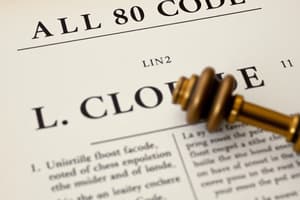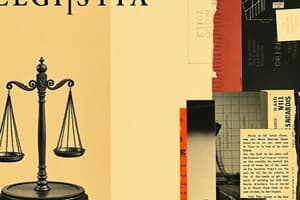Podcast
Questions and Answers
What was the primary driver for the development of modern contract law?
What was the primary driver for the development of modern contract law?
- The growth of international trade
- The expansion of the Catholic Church's influence
- The rise of feudalism in Europe
- The Industrial Revolution (correct)
What is the key principle underlying the freedom of contract?
What is the key principle underlying the freedom of contract?
- Parties are free to decide whether to enter a contract and its contents (correct)
- Contracts are enforced based on the social status of the parties
- Contracts must be fair and equitable for both parties
- Contracts are binding only if approved by the legislature
What is the role of the court in modern contract law?
What is the role of the court in modern contract law?
- The court can only invalidate contracts based on legal incapacity
- The court can only enforce contracts, not intervene in their contents
- The court has no role in contract law, as it is purely a private matter
- The court can strike down unfair terms used in general contract conditions (correct)
What is the purpose of contract law according to the passage?
What is the purpose of contract law according to the passage?
What is the role of non-official actors in the development of contract law?
What is the role of non-official actors in the development of contract law?
How does the law intervene to protect one party against the other in contract law?
How does the law intervene to protect one party against the other in contract law?
Which of the following statements accurately describes the role of academic criticism in civil law jurisdictions?
Which of the following statements accurately describes the role of academic criticism in civil law jurisdictions?
What is the role of soft law in contract law?
What is the role of soft law in contract law?
Which of the following actors is not directly involved in the making of private law?
Which of the following actors is not directly involved in the making of private law?
What is the primary purpose of private law?
What is the primary purpose of private law?
How does the text characterize the relationship between private law and public interests?
How does the text characterize the relationship between private law and public interests?
What is the significance of the statement by Ulpian, the Roman jurist, mentioned in the text?
What is the significance of the statement by Ulpian, the Roman jurist, mentioned in the text?
What is the role of academic criticism in civil law jurisdictions, according to the passage?
What is the role of academic criticism in civil law jurisdictions, according to the passage?
What is the role of 'soft law' mentioned in the passage?
What is the role of 'soft law' mentioned in the passage?
How does the passage describe the role of non-official actors in developing the law?
How does the passage describe the role of non-official actors in developing the law?
According to the passage, what is the primary view of private law as a 'means to an end'?
According to the passage, what is the primary view of private law as a 'means to an end'?
What is the primary criticism of the 'means to an end' view of private law, according to the passage?
What is the primary criticism of the 'means to an end' view of private law, according to the passage?
What is the main argument for the view of private law as a 'normative system'?
What is the main argument for the view of private law as a 'normative system'?
According to the passage, what is the main weakness of contract law?
According to the passage, what is the main weakness of contract law?
What is the core function of contract law, according to the passage?
What is the core function of contract law, according to the passage?
How does the passage characterize the legal definition of a contract?
How does the passage characterize the legal definition of a contract?
What is the main argument made in the passage for viewing private law as a 'means to an end'?
What is the main argument made in the passage for viewing private law as a 'means to an end'?
Flashcards are hidden until you start studying




